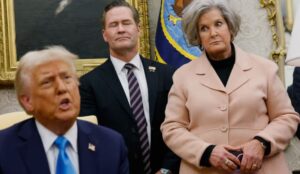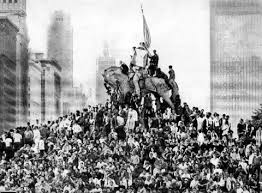Trump’s actions seem to come with little input or deliberation.
Descriptions of the various forms of presidential leadership usually include several basic patterns. A President can lead by deliberating with various stakeholders in and out of government. It is clear The Heritage Foundation headquartered a short walk from the Capitol almost always has ear of this president. But is doubtful their ideas were subject to much presidential deliberation. Or a leader can make a concerted effort to shape public opinion. We have been reminded recently that President Carter employed this form repeatedly in messages, arguing to the nation to be more frugal and conservation minded. Alternatively, a president can demonstrate intent by acting on his or her own ideas. In the words of political scientist James David Barber, he or she can “show an orientation toward productiveness as a value,” flooding the daily news agenda with gestures of decisiveness. George W. Bush liked to use the location that he was “the decider:” a single-minded leader with little patience for parsing various other views.
 Trump is definitely not the West Wings’ Jeb Bartlett, testing ideas with insiders and outsiders from morning to night. Instead, proposals like taking over Panama or invading Iceland, you will pardon the pun, seem half-baked: made mostly in private, but announced with calculated theatrics. The theatre of stale “manly” declarations is his rhetorical method, and about 25 years out of date. The result is that we might get better outcomes with a throw of some dice.
Trump is definitely not the West Wings’ Jeb Bartlett, testing ideas with insiders and outsiders from morning to night. Instead, proposals like taking over Panama or invading Iceland, you will pardon the pun, seem half-baked: made mostly in private, but announced with calculated theatrics. The theatre of stale “manly” declarations is his rhetorical method, and about 25 years out of date. The result is that we might get better outcomes with a throw of some dice.
One could fairly ask how the preposterous idea of taking over a foreign land was not fully studied and discussed by security analysts, both sides of Congress, military leaders, and, most egregiously, the effected governments themselves. After all, these decisions involve sovereign states that were–not long ago–our allies. Ditto on unilaterally renaming Denali, the beautiful word indigenous and more recent residents of Alaska prefer for this grand North American mountain. Senator Lisa Murkowski of Alaska (R) disagrees with Trump’s decision. “You can’t improve upon the name that Alaska’s Koyukon Athabascans bestowed on North America’s tallest peak.” Obviously, place names of indigenous Americans rightfully figure in every corner of the nation. Politico suggests he is just getting started on a binge of unilateral name-changes. Who knows what is in store for the residents of Minnesota, Montana, or New York?
 Aside from the blunt instrument of random tariffs, which has all of the grace of shooting out the neighbor’s windows, the single biggest marvel of executive overreach is his decision to rename internationally recognized name for the Gulf of Mexico. He seems uninterested in Mexico’s or Cuba’s views or, more significantly, the weight of history and tradition that governs long-established geographical features. Changing the name of an international body of water is roughly the equivalent of announcing that Florida will henceforth be known as Swamplandia. Floridians might have other ideas. The U.S. Board on Geographic Names would normally vet name changes. But even a leader who craves the appearance of authority should know that sometimes ‘saying it doesn’t make it so.’
Aside from the blunt instrument of random tariffs, which has all of the grace of shooting out the neighbor’s windows, the single biggest marvel of executive overreach is his decision to rename internationally recognized name for the Gulf of Mexico. He seems uninterested in Mexico’s or Cuba’s views or, more significantly, the weight of history and tradition that governs long-established geographical features. Changing the name of an international body of water is roughly the equivalent of announcing that Florida will henceforth be known as Swamplandia. Floridians might have other ideas. The U.S. Board on Geographic Names would normally vet name changes. But even a leader who craves the appearance of authority should know that sometimes ‘saying it doesn’t make it so.’
In the parlance of decision-making theory, these are all “low knowledge/non-incremental” changes with important ramifications that reach far beyond what the impulsive Donald Trump envisions. Consultation with effected parties on these decisions appears to have been minimal.
Students of how decisions are made note that non-incremental changes preceded by little deliberation represent the least desirable path to change. It’s a theatrical style of leadership more at home in movie script than in our elaborately interconnected world. We now must wait with our former friends for the unintended consequences to roll in.
![]()

